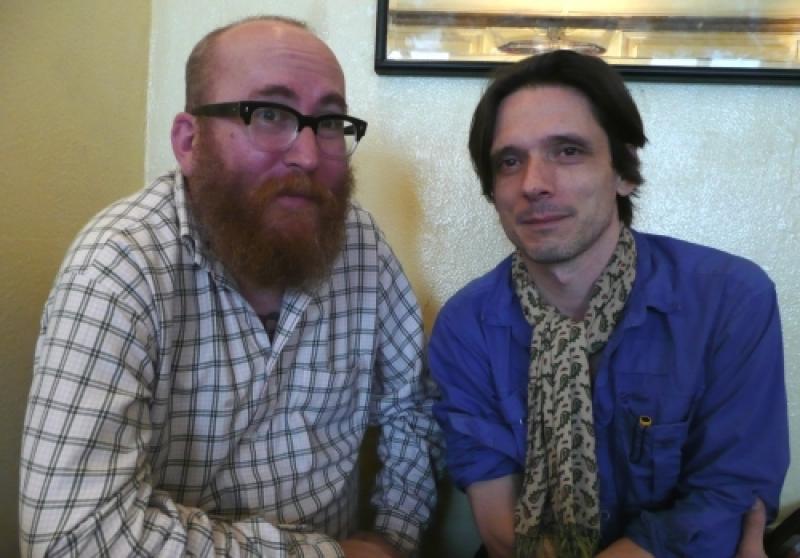Jeremy Deller on The Posters Came From The Walls | reviews, news & interviews
Jeremy Deller on The Posters Came From The Walls
Jeremy Deller on The Posters Came From The Walls
Turner Prizewinning director discusses his film about Depeche Mode fans

"Depeche Mode," says Jeremy Deller, "have always been seen as a bit naff in this country, at least in the media. They could never shake off the image of their earliest Top Of The Pops appearances, so no matter how musically exploratory they got, they tended to be seen as this jumped-up rather silly pop band.
In keeping with Deller's previous artwork, which has focused often on communities and their expressions, whether that be brass bands, the acid house movement or the miners' strike of the 1980s, The Posters Came From The Walls is mainly about "ordinary people." "I know [Nine Inch Nails singer] Trent Reznor is in the film, but essentially we avoided celebrity talking heads because we wanted to focus on the people who made this huge band huge, and on some of the sincere devotion that drove people to almost religious extremes in following them."
This devotion is something that shakes away some of our cynical notions of pop fandom as facile or as a purely economic relationship. "The way people were and still are into them in Eastern Europe and Russia is a huge story," says Deller; "During the time of Communism they were a symbol of resistance, then afterwards a symbol of freedom, and it's incredible exactly how much they mean to people as a result of that. Of course this means that they made no money out of this whole huge audience as everything is based on bootlegging there, although they do get to appreciate how much they are loved there: I saw a film – a bootleg, funnily enough – of Depeche Mode's first concert in Russia, some time in the mid 1990s, and the scenes are absolutely mind-boggling."
The film follows fans from Moscow to Tehran, dancing in Californian parking lots to conducting religious ceremonies in Cambridge, showing the huge variety as well as the intensity of responses to the band's music and image. "Yes, it is about community," says Deller, "about how people group together and form their own interpretations of something to fit their own circumstances. The story of the band is well-enough known by now, but I hope that we can tell it differently, maybe even more vividly through the eyes of those who love them. It is a kind of folk history, I suppose."
The directors posit this "folk history" as in opposition to a media-approved hierarchy in music. "The band say it doesn't bother them that they're not considered cool here," says Deller, "but I'm sure it must irk them a bit, to be huge and respected everywhere else in the world but at home. I mean, even bloody Duran Duran have this sheen of critical approval now, and I rather suspect that's because they became part of the London party circuit, they go to the handbag launches and whatever, which Depeche Mode have never done. Even Oasis – who haven't made a good record since John Major was in power – are somehow cast as the great British export and the band of their time, which of course they aren't and never really have been."
"Depeche Mode," he continues, "are unlike all those bands in that they have remained a real, living, working band throughout their career. They've never done the heritage circuit, or just a couple of arena greatest hits shows at Christmas like Duran Duran even though they've probably sold four times as many records globally as them. They've continued breaking musical boundaries instead: I think [main songwriter] Martin Gore is quite amazing in that he has the respect of the black producers in Detroit who created techno music, but also of the heavy metal community, of goths, of so many different subcultures. And they are truly one of the biggest bands in the world, so it's very bizarre that they are not better respected."
The Posters Came From The Walls screens across the UK on Tues 1 Dec, check www.theposterscamefromthewalls.com for details.
The future of Arts Journalism
You can stop theartsdesk.com closing!
We urgently need financing to survive. Our fundraising drive has thus far raised £49,000 but we need to reach £100,000 or we will be forced to close. Please contribute here: https://gofund.me/c3f6033d
And if you can forward this information to anyone who might assist, we’d be grateful.

Subscribe to theartsdesk.com
Thank you for continuing to read our work on theartsdesk.com. For unlimited access to every article in its entirety, including our archive of more than 15,000 pieces, we're asking for £5 per month or £40 per year. We feel it's a very good deal, and hope you do too.
To take a subscription now simply click here.
And if you're looking for that extra gift for a friend or family member, why not treat them to a theartsdesk.com gift subscription?

Add comment